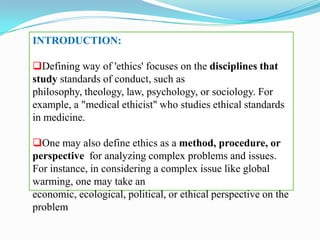How To Navigate Ethical Concerns In Research Effectively
Research Ethics | Ethics In Research
Keywords searched by users: How can ethical issues in research be avoided how to avoid ethical issues in business, how can ethical issues be resolved, how do you identify ethical issues in research, how to address ethical issues in research, ethical issues in communication research, Ethical issues in research, how can you relate ethics in research to your daily life, recommendation for ethical issues
How Can Ethical Issues Be Avoided?
To effectively address ethical concerns and minimize the risk associated with them, it’s essential to follow these five key steps:
-
Thoroughly Assess Your Needs and Resources: Begin by conducting a comprehensive evaluation of your organization’s requirements and available resources. This initial step helps identify potential ethical challenges and vulnerabilities within your operations.
-
Establish a Solid Ethical Foundation: Building a strong ethical foundation is crucial. This entails crafting a well-defined set of ethical principles and guidelines that align with your organization’s mission and values. These principles should serve as a clear roadmap for ethical decision-making.
-
Foster a Culture of Integrity, Starting from the Top: To mitigate ethical risks effectively, instill a culture of integrity throughout your organization, starting at the highest levels of leadership. Leaders must set a positive example by consistently demonstrating ethical behavior, thus encouraging employees at all levels to follow suit.
-
Maintain a “Values Focus” in All Situations: Upholding ethical standards should be a priority in both significant decisions and everyday actions. Cultivate a workplace environment where employees consistently prioritize and apply ethical values, regardless of the scale of the situation.
-
Regularly Re-evaluate and Adapt: Ethical considerations are not static; they evolve over time. Periodically review your ethical framework and policies, and be prepared to revise them as necessary to address emerging ethical challenges and changing organizational needs.
By following these steps, organizations can proactively reduce ethical risks and create a foundation for ethical conduct. Regularly revisiting and adapting these strategies ensures that ethical standards remain relevant and effective in an ever-changing landscape. [Original date: October 25, 2021]
How Can Ethical Issues Be Overcome In Research?
Addressing ethical concerns in research is crucial for maintaining integrity and trust in scientific endeavors. One effective approach involves conducting comprehensive debriefing sessions with participants after the research has concluded. In these sessions, it is imperative to provide participants with essential information, including the true purpose of the study, especially if any form of deception was involved. This process helps ensure transparency and fosters a more ethical research environment. As of May 31, 2022, this practice is considered standard in research ethics.
How Can We Avoid Ethical And Credibility Issues In Research?
How can we ensure our research maintains high ethical standards and credibility? Effective communication of research findings can sometimes give rise to ethical dilemmas. The fundamental principles of good science communication encompass honesty, reliability, and credibility. It is essential to prioritize transparency in presenting research results, enabling a clear understanding of the methodology and outcomes. Additionally, one should proactively take measures to prevent plagiarism and research misconduct, upholding the integrity of the research process. This includes proper citation and adherence to ethical guidelines in research practices (as of the information available up to October 18, 2021).
Collect 8 How can ethical issues in research be avoided

![PDF] Ethical issues in qualitative research: challenges and options | Semantic Scholar Pdf] Ethical Issues In Qualitative Research: Challenges And Options | Semantic Scholar](https://d3i71xaburhd42.cloudfront.net/7429ec851e5e90570e0fe824a3cc63221d6aeec9/2-Table1-1.png)



Categories: Top 78 How Can Ethical Issues In Research Be Avoided
See more here: phauthuatdoncam.net

One way of dealing with most ethical issues is to ensure that participants are thoroughly debriefed after the research has taken place. During a debriefing session, participants must be told the following information: The true nature of the study, if there has been some element of deception.The way you communicate your research results can sometimes involve ethical issues. Good science communication is honest, reliable, and credible. It’s best to make your results as transparent as possible. Take steps to actively avoid plagiarism and research misconduct wherever possible.Ethical decision making in academic research focuses on providing maximum benefits to the participants. Following ethical principles in research is indeed crucial for maintaining the integrity of the study. Human Subjects Protection: Respect human dignity and take special precautions wherever needed.
- Discuss intellectual property frankly. …
- Be conscious of multiple roles. …
- Follow informed-consent rules. …
- Respect confidentiality and privacy. …
- Tap into ethics resources.
- Honestly assess your needs and resources.
- Establish a strong foundation.
- Build a culture of integrity — from the top down.
- Keep a “values focus” in moments big and small.
- Re-evaluate and revise as needed.
Learn more about the topic How can ethical issues in research be avoided.
- Five principles for research ethics
- Five Keys to Reducing Ethics and Compliance Risk – Free Ethics Toolkit
- Dealing with ethical issues | Consent, deception, ways to deal with issues
- Ethical Considerations in Research | Types & Examples
- Research Ethics & Misconduct: What Researchers Need to Know – Enago
- How to improve ethics in the workplace ¦ cHRysos HR Solutions
See more: https://phauthuatdoncam.net/real-estate